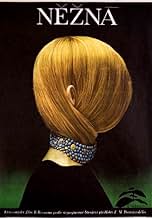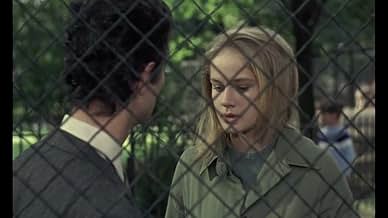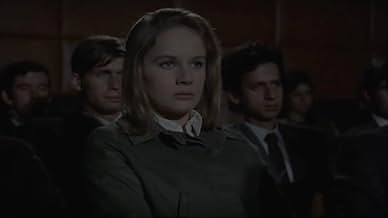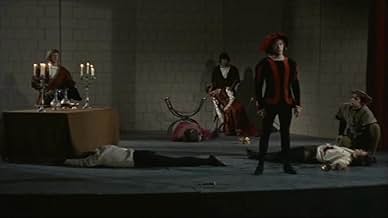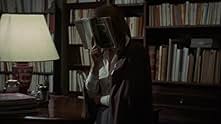Ajouter une intrigue dans votre langueA young woman kills herself, leaving no explanation to her grief-stricken pawnbroker husband. We learn in flashback about how they met, married, and how she failed to adapt her lifestyle to ... Tout lireA young woman kills herself, leaving no explanation to her grief-stricken pawnbroker husband. We learn in flashback about how they met, married, and how she failed to adapt her lifestyle to his. Disgusted with his attempts to dominate her, she considered murdering him, but found ... Tout lireA young woman kills herself, leaving no explanation to her grief-stricken pawnbroker husband. We learn in flashback about how they met, married, and how she failed to adapt her lifestyle to his. Disgusted with his attempts to dominate her, she considered murdering him, but found herself unable to do it.
- Director
- Writers
- Stars
- Prix
- 1 victoire au total
Avis en vedette
A Gentle Woman leans more to searching for common sense where there is none: Elle is a simple girl in a family that doesn't treat her well (we don't see this, we just hear it second-hand), and has a gentle quality (or 'meek' as Dostoyevsky's story was originally titled) that somehow allures Luc, who works as a pawnbroker. He pursues her, even though she's not much interested in his advances ("I told you not to follow me," she says to him as he follows her up to his house, in a tone soft but firm). He marries her. They seem momentarily at peace, but this soon breaks: Luc is continually insecure with himself, in a sense, because he can never feel secure in his relationship. Unlike That Obscure Object of Desire, where there was a mind-game involving the sex in the possessive relationship, there's no question that they do go to bed. It's the whole factor of what's really there in terms of trust, love, redemption, and above all a connection between two people. A scene that could be in a silent film (a form Bresson desperately would love to have tried), the couple are watching a film in a theater, and she is sitting next to a guy on her other side. Luc can't stand this, and almost on instinct he stands so the two can switch. A glance, or a couple of glances, speak a thousand ideas in a Bresson film.
In fact it's Bresson's attempts, as in other films, to try and intellectualize an emotional downward spiral that gains interest. Because it's the opposite of your usual melodrama, where the characters get all excited and angry and yelling and lots of misunderstandings and so on, the style is stripped down, leading to what is a much more distressing relationship they're in. Neither one can give in, but Elle just can't seem to leave him or go through an affair. And Luc likewise can't seem to ever go to lengths of domestic violence or on the flip-side leaving him. It's all about him having her, not the other way around, and the moments that she tries and asks him about his past doings (i.e. being fired from a bank teller job) he hesitates. There's a mold in shape that he can't seem to break of her, and by the time he goes for it and says over and over "I love you" it's clear as day- she's already past that point saying "I thought you were going to leave me." Enigmatic, maybe, it depends on the viewer.
It might be understandable this is one of Bresson's least available selections (no DVD yet, and a very paltry availability on the internet quarters of VHS sales), even though it shouldn't be. It's a fascinating experiment in dissecting character through narrative (albeit Bresson cuts back and forth between Luc at Elle's dead body at the bed a wee bit much through good narration from him), and in revealing little things about the relationship for a modern audience. There's a subtext I liked that dealt with diversions, theater, television, films, that are like little respites for the two of them (for Elle more-so, as we see with her interest in Hamlet). And, of course, the Catholic dimension of feeling- from Dostoyevsky carried over into Bresson- is felt more that almost any other of his films; divorce, it seems, is never called into question. This makes it dangerously close to being behind-the-times with its ultimately tragic fate for the characters.
But it also puts up an ultimatum of morality, not just for Luc but for Elle in hindsight: the film doesn't condone suicide, for all of the poetic splendor it's revealed in at the start and finish (not to mention that amazing final shot of the coffin being nailed in). Many interpretations, existential, feminist, even Marxist to a smaller extent, could be taken into account. One thing is for certain: A Gentle Woman isn't an easy film to digest, but for those willing to give it a shot it offers some intriguing layers beneath the subdued manner. By the way, watch for the scene that finally comes up that was taken for the (somewhat misleading) video cover; it's a total 180, aside from the basic initial physical motion, of a similar scene in Goodfellas!
Une Femme Douce is a story of a love that fails, and feels very realistic. The success is down to the Bressonian style, which I usually find antithetical. Normal people as opposed to professional actors, are not very facially demonstrative; so when I saw the couple in this movie I really felt like I was watching a real couple. The lack of demonstration leads to a sense of ambiguity at key moments. There's a kind of Renoir-ian multifacetedness which tends to see a person as a congregation of souls pulling in different directions, jostling for the rudder, rather than as a coherent identity. But there's also ambiguity in the sense that the couple plain just can't read each other at points. There are several examples of uncorrected miscommunication in the film which again feels very authentic in terms of relationships.
Some people have great difficulty finding someone to love and share their lives with, may only get one attempt at something that could work, and often fail. That's a great, very human tragedy, that you don't get to see very often at the cinema. This story of a young couple, the man a pawnbroker, Luc, the woman simply known as "elle", is a story of two people who don't fit in modern life. She is fey, inquisitive, at home with the natural, distrustful of people, and entirely at odds with the systems of living that define human "progress". Luc is the opposite, a creature of the system, he makes money from debt, has fixed expectations about relationships, and lacks spontaneity. She suffers from weltschmerz, a pain of the sensitive that arises from an understanding or feeling of how life could or should be in comparison to the dismal and feeble structures that we have. They try to inhabit the centre ground together, but the compromise doesn't hold.
I like that the film acknowledges that even the most significant moments in a person's life can be fairly banal, a fleeting disengaged conversation on a bench at the zoo in this film.
Although I chose to see the film as a rather blameless story, you could view "elle" as the victim of Luc, who compares himself to Mephistopheles at one point. The film is feminist under that sense, although I think in a very patronising way. For example, at various points in the movie, the TV in their apartment shows spectacles which are very male-oriented, such as motor car racing. There's a sense that culture is about the male, that authentic female culture is something rare and unpreserved. I don't think that "elle"'s condition is unique to women, it actually reminds me RD Laing on schizophrenia: "The experience and behaviour that gets labelled schizophrenic is a special strategy that a person invents in order to live in an unlivable situation."
It's worth pointing out that the film is substantially aided by the talents of Ghislain Cloquet, one of the great cinematographers, who certainly was shooting only top drawer material in this film.
It is a matter of irony to me that although Bresson chose non-professionals, as usual, for this film, Dominique Sanda ("elle") later went on to win Best Actress at the Cannes Film Festival seven years later. The role demanded someone beautiful, so Bresson picked her up from her job as a model for Vogue. Guy Frangin (Luc) on the other hand has this film as his only credited role.
Le saviez-vous
- AnecdotesRobert Bresson chose Dominique Sanda just as a result of her first voice call.
- Gaffes(at about 18 minutes) Guy and Dominique swap places in their cinema seats before they are actually seen to do so in the final shot of that scene.
- ConnexionsFeatures Benjamin ou Les mémoires d'un puceau (1968)
Meilleurs choix
- How long is A Gentle Woman?Propulsé par Alexa
Détails
Box-office
- Brut – à l'échelle mondiale
- 2 356 $ US
- Durée1 heure 28 minutes
- Mixage
- Rapport de forme
- 1.66 : 1
Contribuer à cette page


